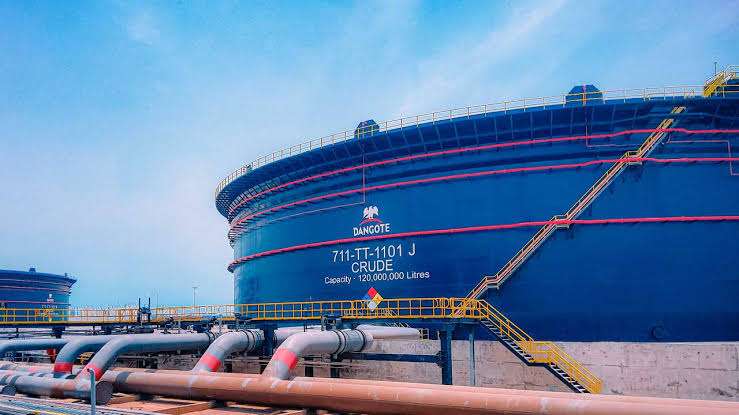Business
Dangote Refinery to dump Nigerian crude for WTI Midland

…makes $16m gain in a recent deal
More facts have emerged on why the largest single-train refinery in the world, Dangote Refinery Lekki, owned by Africa’s richest billionaire, Alhaji Aliko Dangote, decided to import crude from the U.S. According to reliable sources privy to the deal, it was a business transaction largely influenced by economic considerations.
It would be recalled that the Dangote Refinery had purchased 2 million barrels of West Texas Intermediate (WTI) Midland from the second-largest oil trader in the world, Trafigura, to be delivered at the end of February.
When news of the purchase broke last week, many had questioned its financial propriety, with some blaming it on the inability of the Nigerian National Petroleum Company Limited (NNPCL) to meet the refinery’s crude oil needs after mortgaging over 30% of its future crude for cash.
However, Business Hallmark reliably gathered that the shrewd Kano-born billionaire, apart from other obvious reasons, decided to go for the cheaper American crude, which has become very competitive in the global market.
Compared to Nigerian premium grades of Bonny Light, Agbami, Qua Iboe, Brass River and others, which are benchmarked against Europe’s North Sea’s Brent, America’s WTI Midland light crude is far cheaper and more affordable
Dangote Refinery, reliable sources told Business Hallmark, made at least $8 each on the 2 million barrels of crude oil it purchased from the U.S. The total gain is in the region of $16million.
BH’s independent checks revealed that Brent crude oil prices averaged $82.03 between January 15 and 19 when Dangote Refinery reportedly made the purchase from Trafigura, compared to $76.78 for WTI Midland oil and $84.19 for the OPEC basket in the same period.
An oil and gas consultant privy to the deal told Business Hallmark that owing to the quantum leap in U.S crude oil output, American oil companies have been offering deep discount on their West Texas Intermediate (WTI) Midland crude stocks offered for sale in the global oil market.
This, according to the source, has made American crude more competitive than Nigerian premium grades.
“I know many Nigerians were confounded by the recent announcement that Dangote Refinery purchased crude oil from the U.S.
“They should know that Dangote is not stupid. A discerning observer would have known that there is a catch in him going as far as the U.S to get feed stocks for his refinery.
“The major reason, apart from the other valid ones being bandied about in the media, is the wide difference in the prices of Nigerian crude grades and the U.S WTI Midland.
“Nigerian barrels that are of comparable quality to WTI trade at a premium to Brent. For instance, while WTI closed at $72.28 at the end of trading on Friday, February 3, 2024), Brent crude closed $77.33, a difference of $5.05, while Nigeria premium grade, Qua Iboe, traded at $81.63 (8 hours delay), a difference of $9.35. All Nigerian crude grades traded above the $80 mark within the same period.
“So, if you are a businessman, which one will you go for if you have the option?”, the source demanded.
When he was questioned on the attendant costs that will be incurred in the process of bringing the crude oil to Nigeria, the source described it as negligible compared to the huge gains made from the transaction.
“Yes, you are right. Costs will be incurred in the process of bringing the product from abroad. But you should also know that almost the same costs will apply to products shipped from inside Nigeria because we don’t have the type of super tankers needed to transport crude oil in the region of 1 million barrels in the country. Apart from this, shipping costs are universal.
“If you like, bring in your products from Escravos in the Niger Delta or Abdijan in Ivory Coast, the difference won’t be much because shipping costs are benchmarked and relatively the same all over the world.
“Also, we don’t have the kind of vessels that can carry millions of barrels at one. They will need to come from Europe, Morocco, Angola or South Africa to lift crude from the Niger Delta before going back to their bases abroad. At the end of the day, it (transport cost) will all boil down to almost the same thing”, the source added.
BH checks revealed that shipping costs are calculated by barrel, with the cost of transporting a barrel ranging from $10 to $15, based on several factors like distance and the capacity of the vessels.
Huge super tankers that can lift 950,000 litres and above, it was gathered, give huge discount to customers, which they recoup from the massive volumes of crude they normally transport. While smaller vessels tend to charge more in other to accommodate the cost of fueling, port charges, personnel wages and other expenses and still make profit.
Multiple sources informed our correspondent that using the lowest amount in the price band, which is $10 per barrel, Dangote Refinery will be needing about $20million dollars to bring the 2 million barrels of crude oil to Lagos.
“Don’t be surprised that it must have cost him (Dangote) more to bring in the first six million barrels he got from Nigeria to his refinery in Lagos.
“This is so because all the six vessels used in the massive operations did not originate from Nigeria. Infact, only one came from Africa. The transportation cost will crash only when his undersea pipeline is put to use”, a stakeholder in the shipping industry explained.
Speaking on the development, the President of the Nigerian Chamber of Shipping (NCS), Mallam Aminu Umar, confirmed that no single Nigerian shipping firm participated in the lifting of the six-ship crude oil delivered to the Dangote Refinery between December 2023 and January this year due to the very large sizes of ships required for the tasks.
“There were two deliveries at the Dangote Refinery; the first was the test-running stage, where gas oil was brought in to flush and power the system; while the second stage was the crude oil delivery stage, where crude oil products were brought in.
“My shipping company was one of the two companies that delivered the gas oil that was used to flush and power the system at the Dangote Refinery.
“The gas oil that we supplied was used in test-running and flushing the system at the Dangote Refinery. Our company was the only local shipping firm that participated in this process while the second company was an internationally owned shipping company.
“After the system was flushed, the refinery took delivery of six crude oil ship, but no Nigerian company participated in that stage. This is because currently, Nigeria does not have the kind of ships that were used to bring in crude oil products to the Dangote Refinery.
“Six shipping companies brought in crude oil products to the Dangote Refinery, and only one of them was from an African country; Angola to be precise.
“The other five were foreign shipping companies from outside Africa. No Nigerian currently has the size of vessels that were used to move crude oil products to the Dangote Refinery. I am talking of vessels called Suez Max.
“A Suez Max is a type of vessel that can load a million barrel of crude oil products, which is equivalent to 150,000 dead-weight vessels. As at today, there is no Nigerian that has a 150,000-dead-weight vessel trading in crude oil.
“We were the only indigenous shipping company that participated in the first stage while there was no Nigerian company that participated in the second stage”, the NCS chief lamented.
It would be recalled that the Dangote Refinery, with a daily processing capacity of 650,000 barrels, commenced operations in January with an initial processing rate of 350,000 barrels per day.










